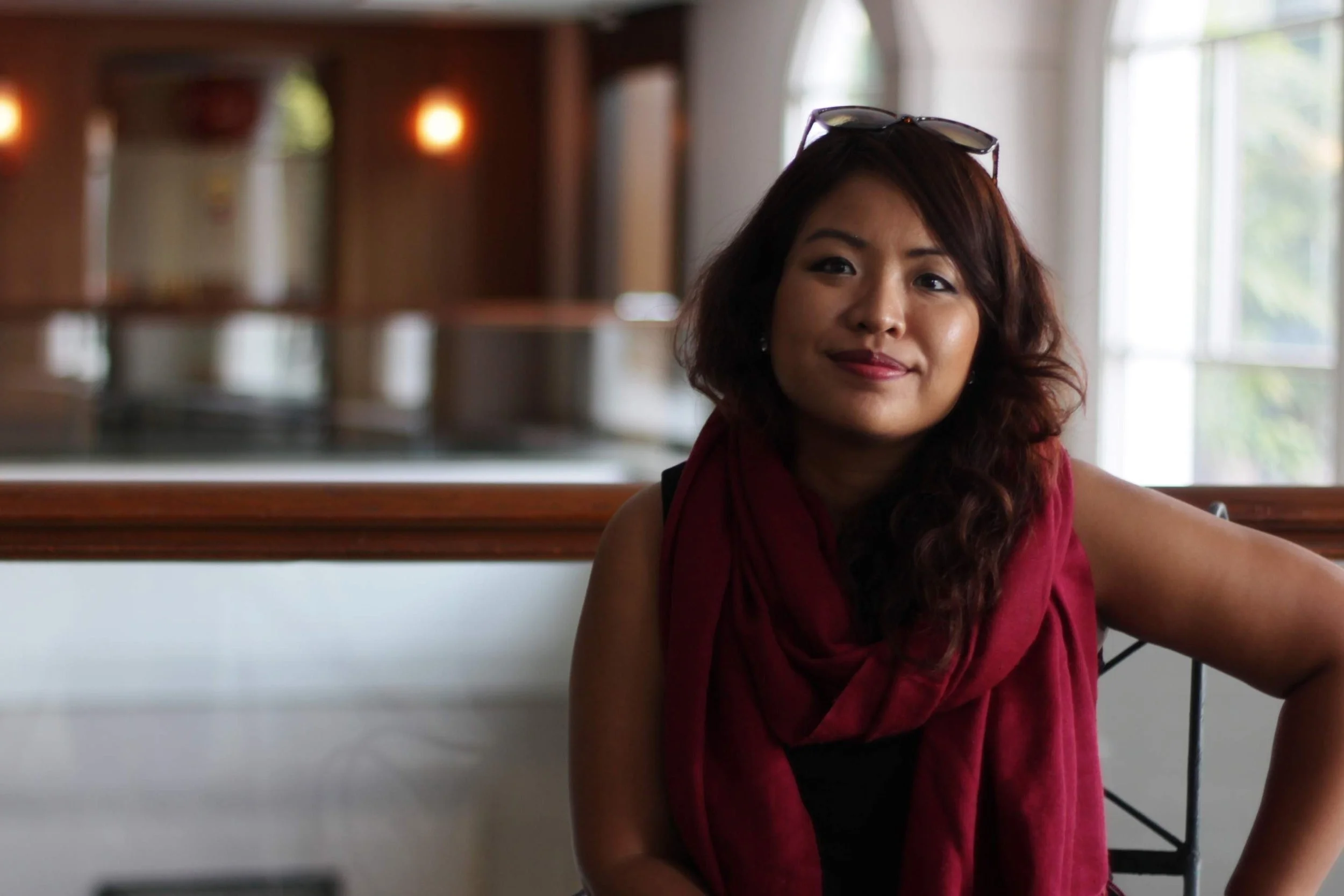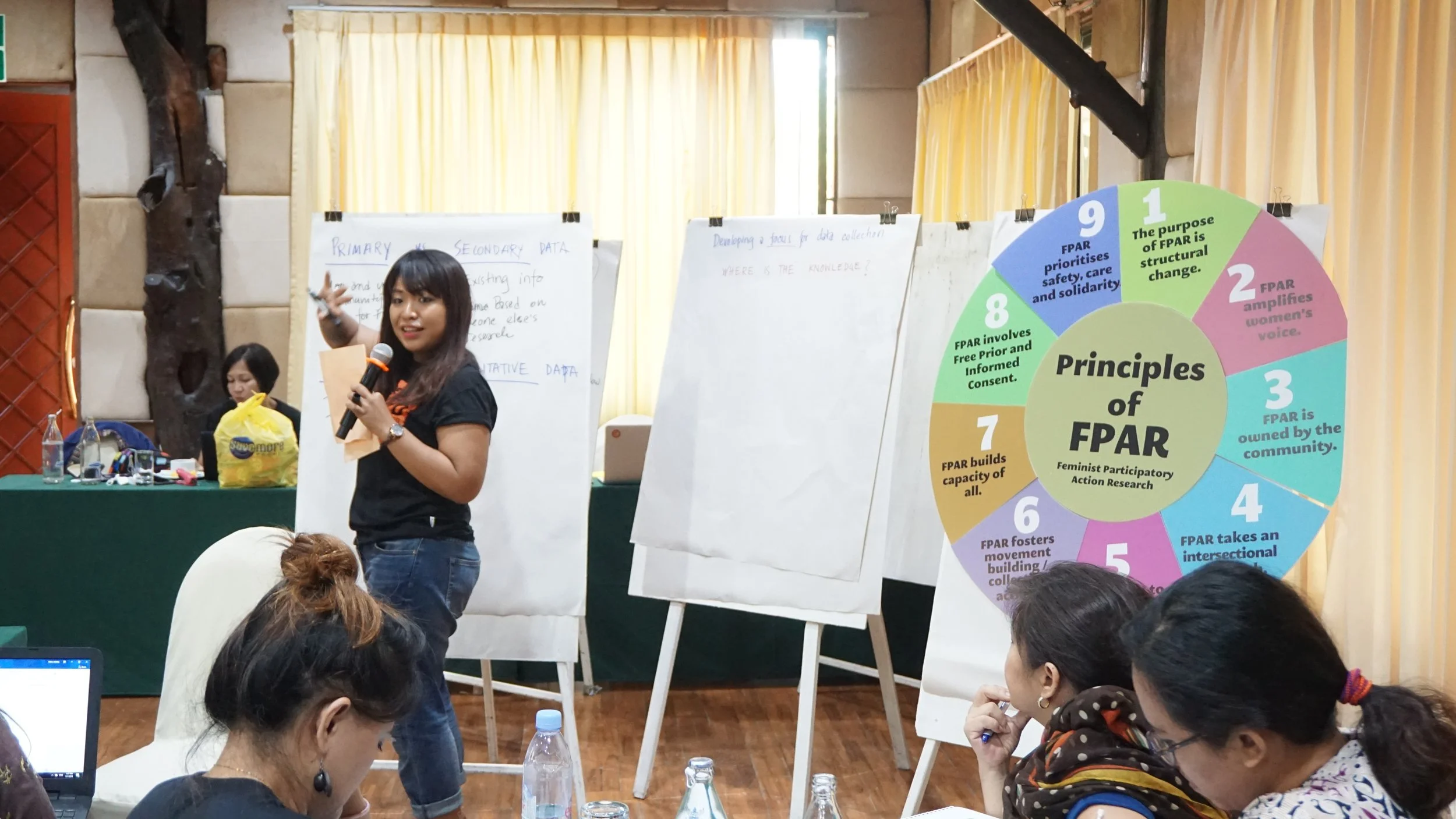Trimita Chakma, in Her Words
Content Warning
This text deals with highly sensitive topics, including violence against women, which some readers may find upsetting.
Trimita Chakma
Trimita, even before you decided to quit your life in IT to become a full-time activist, you were already volunteering at the Kapaeeng Foundation, the Indigenous Organization for Indigenous Peoples in Bangladesh. Could you tell us about your life before joining the Foundation? Do you recall any events, experiences, or circumstances that nudged you toward becoming a feminist and human rights advocate?
My journey of becoming a feminist and human rights advocate began with a painful personal experience. When I was about eleven years old, I was molested by my trusted school tutor, who was older than my father and had a daughter my age. At the time, I lacked the language to describe the incident and couldn’t tell anyone about it. I wondered if it was my fault and why he had chosen me. I dealt with the situation by ensuring I was never alone with that teacher again.
Fast forward eighteen years to 2012: Sujata Chakma, an eleven-year-old girl from my Indigenous community, was brutally raped and murdered. Allegedly, the same perpetrator had raped her cousin just a year before. I say “allegedly” because it was nearly impossible to prove the rape in court. The injustice of it all made me so mad! I remembered my eleven-year-old self having to hide, but Sujata and her cousin had no place to hide because they were living in the Chittagong Hill Tracts (CHT) of Bangladesh, where I am from.
Sexual violence against Indigenous girls and women in the CHT is a complex issue, intertwined with settler colonialism, patriarchy, racism, and militarization. Impunity prevails as perpetrators, often Bengali men in positions of power, escape accountability. I came to realize that this violence is part of a larger pattern. This is when the personal became political for me. I found myself organizing protests and advocating for legal reforms to seek justice for Sujata, her cousin, and their families. A group of us performed V-DAY’s The Vagina Monologues in Dhaka to raise money for legal aid. It was during this time that I received a grant from the Asia Pacific Forum on Women, Law and Development (APWLD) through the Kapaeeng Foundation to conduct a Feminist Participatory Action Research (FPAR) project on sexual violence against Indigenous women in my community. This timely support allowed us to advance some legal work around justice for Sujata Chakma and her survivor cousin, but still so much more work needs to be done.
How do you think your strong background in IT has supported your activism? Speaking as a technologically-challenged person, I’m fascinated to learn (in layperson’s terms) how your earlier education and work experience complement, for example, the application of an FPAR framework to a particular issue. Could you give us an example?
Growing up, I was a total science nerd! I was obsessed with the universe and everything beyond our planet. In my free time, I devoured science fiction and studied rockets, dreaming of becoming a rocket scientist someday.
After completing my BSc in Electrical Engineering and Computer Science in Germany, I worked as a programmer at the local UN office in my hometown. I then pursued an MSc in IT Management from Carnegie Mellon University, which was the world’s top ranked programme at the time. With my fancy degrees, it was easy to land a job in the tech sector in Bangladesh. However, I quickly realized that to be taken seriously in the tech industry, I had to either behave like men or be aggressive. This is not who I wanted to become.
Even though I was great at programming, managing a team of programmers, and even leading a small tech startup, I found myself increasingly disconnected from the tech world. Maximizing profit for the company I worked for seemed so meaningless. In contrast, my volunteer work gave me a greater sense of joy and purpose. That's when it hit me — I didn’t want to spend most of my productive hours with people whose values didn't match mine.
It was a turning point in my career when the Asia Pacific Forum on Women, Law and Development (APWLD) offered me a full-time position as a research associate. I made the decision to leave my IT career behind and fully embrace my role as a professional feminist. This has been the best decision of my life. I’ve had the privilege of working alongside some of the most inspiring activists and change-makers from around the world. The relationships I've built and the experiences I’ve had in this field have been truly life-changing.
My background in IT has proven to be valuable in unexpected ways. For instance, my tech skills in software design, databases, web development, and programming allow me to quickly build basic database applications and websites using open-source tools, which have come in handy for campaigns with limited resources. When I needed to set up the FPAR Academy digital platform, I did it all by myself in just a few days.
One of the biggest advantages I have from my IT training is an efficiency mindset. I think I am a skilled project manager, which helps me to get things done faster than others. For some reason, this skill seems to be rare In the humanitarian and development sector!
What convinced you to join FLAC when you were first approached? Did you have any concerns before joining? Four months in, how do you feel about your journey through the Co-laboratory? Is there something that makes you especially excited about the future? Do you foresee any challenges?
When FLAC first approached me, I was intrigued by their mission and vision. As someone who’s been deeply involved in promoting non-traditional data and evidence generation through my FPAR work, and my work with the Gender and Environment Data Alliance (GEDA), FLAC's goals really resonated with me.
Over the past decade, I’ve collaborated with countless grassroots activists, using FPAR to influence policies and practices on critical issues like climate justice, labor rights, and land rights. The opportunity to work with a community of funders committed to bringing feminist values, politics, and theory into practice at the intersection of gender and the environment sounded promising.
Now, four months into this journey, I’m feeling energized and inspired by the experience so far. Collaborating with this remarkable group of “co-conspirators,” who share a passion for transformative learning and action has been very rewarding. I’m hopeful about FLAC’s potential to drive meaningful change by influencing how funders approach their work through an intersectional feminist lens. By shifting mindsets, practices, and resource flows, we have a chance to create some real systemic impact.
That being said, I do anticipate some challenges ahead, particularly around navigating resistance to non-traditional ways of knowing and doing. In my experience, decolonizing knowledge production and challenging Eurocentric epistemologies that have long dominated development discourse has always been a challenge. We need to create space for other worldviews, experiences, and forms of knowledge, particularly from indigenous communities and the Global South. Developing a decolonial perspective requires persistence, adaptability, and a willingness to engage in difficult conversations.
We know that Eco-FPAR is in its theoretical stages, but could you give us a working definition of Eco-FPAR? Could you perhaps share with us a couple of examples or experiences in which you applied this framework that were especially significant to you? Perhaps you consider them an unequivocal success or an instance that taught you an important lesson?
In essence, the emerging concept of Eco-FPAR extends our work on the Feminist Participatory Action Research (FPAR) framework to explicitly address the interconnectedness of human and planetary well-being. It recognizes that the health of people and the planet are inextricably linked. So, while FPAR has historically been more human-centric, Eco-FPAR aims to de-center humans and position the environment as an active agent and co-researcher in the process.
The goal is to dismantle oppressive systems like patriarchy, colonialism, and capitalism to create a transformed world where the reciprocal relationship between people and nature is at the center. We draw a lot of inspiration from Indigenous wisdom in understanding humans as part of the environment, not separate from it.
In terms of examples, a lot of the initial thinking around Eco-FPAR emerged from APWLD’s Climate Justice FPAR program, in which my co-author Naomi Godden and I were involved. For instance, in Pakistan, women recorded the impacts of extreme weather events and advocated for forest restoration and stronger environmental policies in their communities. In Vietnam, women promoted the traditional practice of using organic banana compost to address soil degradation. And in Nepal, women planted over 1,000 plant varieties to protect river embankments against flooding.
Through these projects, we saw FPAR’s power in linking human and environmental well-being. But we realized the methodology could go further in explicitly centering this relationship, especially in light of the climate crisis. That’s what led us to start conceptualizing Eco-FPAR.
It's still early stages, but my co-author and friend Dr. Naomi Godden is working with Indigenous Australian communities to develop Eco-FPAR's theory and practice. A key question is: Rather than humans speaking for nature, how can the environment itself participate as a co-researcher? What does partnering with forests, rivers, and land truly mean?
What do you like to do in your spare time? Do you have non-human companions? What’s your favorite place to visit or to hang out at? What kind of music do you listen to? Do you enjoy watching TV series or movies? If so, which ones?
Whenever I can take some time off, I love to plan vacations around scuba diving. Exploring the underwater world and getting up close with marine life is incredibly peaceful and rejuvenating for me. It’s my favorite way to unwind and disconnect from my busy life.
With my busy schedule though, extended dive trips aren’t always feasible. So when I have smaller pockets of free time, I love losing myself in a good book. Lately, I’ve been going for walks at Namsan Park in Seoul while listening to audiobooks or podcasts. It’s a great way to fit in some “reading” time while getting fresh air and exercise. I recently finished Nancy Fraser’s Cannibal Capitalism, a fascinating non-fiction book that offers a feminist marxist analysis of our current economic system. For fiction, I loved The Sympathizer by Viet Thanh Nguyen, a gripping novel that explores the Vietnam War from a unique perspective. I’m also a big fan of the works of Amitav Ghosh and Arundhati Roy.
I’ve been a diehard Radiohead fan since high school, and they’re still my favorite band. There's just something about their hauntingly beautiful yet experimental sound that deeply resonates with me.
When it comes to TV shows and movies, I have pretty eclectic tastes. I enjoy classic mysteries and gritty crime thrillers like True Detective or the Korean series Stranger. But I’m also a big fan of more imaginative, genre-bending works like Guillermo del Toro’s Pan's Labyrinth, and sci-fi noir anime like Cowboy Bebop or Ghost in the Shell. And of course, I’m a huge fan of anything produced by Studio Ghibli — their films are pure magic.


